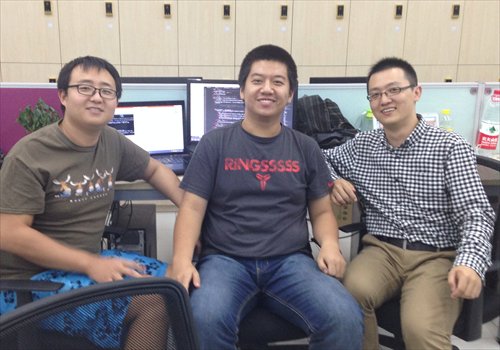Dropping out of the rat race
Young Chinese are leaving college early to try to make their own fortunes, but it doesn’t always end well

A number of Chinese college students are swapping their textbooks for briefcases by striking out on their own before completing their degrees. Photo: Li Hao/GT
Although the new university semester is about to commence, Wu Jian feels no compunction to return to his studies.
He has spent his two-month summer vacation absorbed in growing his own start-up enterprise, developing education-based games for smart phones. Now, in his last precious days of freedom before he will again be encumbered by school, Wu has a decision to make. To continue his postgraduate program in industrial engineering at Tsinghua University? Or to devote himself fully to his fledgling company?
The next day, Wu hands in his application to suspend his studies.
Following in the footsteps of giants
"Investors aren't willing to finance people who are still full-time students and only part-time entrepreneurs," said Wu. "My company has been attracting interest from venture capitalists, and we'd like to develop at a faster pace. It's the right time for me to leave school."
Born in 1991, Wu co-founded Super Nova Games earlier this year with several of his former high school classmates. The company already has nine full-time employees, and are currently based in temporary offices at X-lab, an incubator space run by Tsinghua University.
Inspired by the well-publicized success stories of college dropouts like Bill Gates (Microsoft), Steve Jobs (Apple), Mark Zuckerberg (Facebook) and Jack Dorsey (Twitter), Wu is among an increasing number of young Chinese born in the 1990s who have decided to flout the conventional wisdom regarding the importance of acquiring a college education, and are instead trying to carve their own paths as entrepreneurs.
In China, one of those who have already managed to follow in the footsteps of such entrepreneurial giants is Li Xiang, the founder of a Web portal that provides comprehensive information for car buyers.
Li's company was listed in December last year on the New York Stock Exchange, making Li into a billionaire.

Photo: IC

Wu Jian (right), the cofounder of startup Super Nova Games, with two of his collaborators. Photo: Courtesy of Wu Jian
"The sooner the better"
"In my opinion, if a person decides to drop out of school in order to pursue their own entrepreneurial activities, the principle to follow is - the sooner the better," said 22-year-old Yin Sang, who abandoned his entrepreneurial studies at Bentley College in Boston two years ago, despite having been awarded a full scholarship.
Returning to China, Yin developed Yiqichang ("Let's sing together"), a mobile phone application that streamlines the karaoke experience. Through the app, users are able to reserve rooms ahead of time, and coordinate with friends who will be at the planned karaoke session. In addition, the app includes gaming and voice recording functions for use during the karaoke session.
After securing venture capital from International Data Group (IDG) in April this year, Yin has seen his stock rise among the current crop of young Chinese entrepreneurs.
IDG is a global information technology and research organization founded in Massachusetts in 1964. Their venture capital activities have seen them manage a portfolio of over 220 companies in the last 17 years.
"It happened step by step," said Yin. "Ever since I was at primary school, I'd been inspired by Bill Gates to try to create something innovative in the world. When I was attending high school in the US, I tried several times to start my own company, and at college, I won several competitions for start-up company proposals," said Yin.
Yin said that all seven of his classmates who were studying entrepreneurship at Bentley College had halted their studies prematurely in order to start their own companies. When he met with IDG in their Beijing headquarters last year, he was told that in addition to his own project, the two other projects IDG was investing in were also developed by college dropouts.
Another reason for Yin leaving school early was in order to give himself the time to study those things that he was really interested in.
"For example, I like reading literature and philosophy," said Yin. "Dropping out of school doesn't mean I don't want to continue learning and improving myself."
In addition, Yin pointed out that in the digital age, there are a number of online education platforms that provide an alternative means of learning other than college.
Dropping out at any cost
Although a growing number of college students have suspended or abandoned their studies to chase their own entrepreneurial ambitions, success is far from guaranteed.
According to a report that appeared in China New Time in August this year, 45 percent of all startups will shut down within the first year of operations, and only 30 percent will still be in business after three years. The same report noted that of the startups founded by college students or dropouts in 2010, a staggering 97 percent ended in failure.
Among the many whose first attempts to carve out their companies did not quite go to plan is 24-year-old Wang Zi.
Wang, who was enrolled in enterprise management at Michigan State University, suspended his studies last summer to return to China. He started up his own company, called Voice Paper, and began to work on a mobile phone application that would enable users to book at restaurants through popular Chinese social media platform WeChat.
But a year later, Wang had not attracted any interest for his ideas from investors.
"It was a pity, because I put a lot of effort into promoting it. But I'd neglected the fact that small and mid-sized restaurants would think that the cost of installing such a service would be too high," said Wang. "I had to abandon it."
Nevertheless, Wang does not regret his decision.
"I was paying around 200,000 yuan ($32,625) in tuition fees out of my own pocket every year," said Wang. "With the Internet, the business world is quickly and dramatically changing, but at the college we're still taught basic business theories that are now mostly outdated and useless."
Wang, who has no plans to return to university, said he views the past year as time well spent rather than time lost. His first attempt at an entrepreneurial venture had given him the opportunity to learn what it takes to successfully start a company, he said, and he is now working on a new venture.
"An American college cannot equip me with knowledge of the Chinese market," said Wang. "Having a decent degree helps, but in the business world, what's more important is what you've managed to do. That's what employers and investors care most about."
Doing it for the experience
While some believe leaving college brings particular advantages when trying to start a business venture, Steven Tian, a venture capitalist who preferred that the company he works for remain unnamed, said that the attention being paid to whether young entrepreneurs are college dropouts or not is misplaced.
"There are very few examples of college dropouts being successful in their startup ventures in China," said Tian. "When we decide to invest capital into a company, it represents an investment in the people behind it. We don't place any particular value on whether the candidate is a dropout or not, because the label doesn't tell us anything about the overall qualities or competencies the candidate and his or her team possess," said Tian.
Tian said that he had examined a number of projects from young entrepreneurs. While he admitted that they tended to be quite innovative, he felt that the young entrepreneurs he met lacked practical experience and the understanding of the market required to bring their ideas to fruition.
Perhaps one advantage to be gained from leaving college early is the opportunity it affords for budding young entrepreneurs to gain real world experience early.
"Most people fail before achieving success," said Wang. "The most crucial thing is simply to ensure your own survival and the survival of the company."
Wu, who attended the same high school as Wang, agreed wholeheartedly. For him, the decision to suspend his studies at Tsinghua University did not emerge only out of his desire for overnight entrepreneurial success, but is a reflection of the values by which he wishes to live his life.
"I envisioned the kind of life I would have if I kept following the conventional path that had been set out for me. I would graduate, become an intern at a big IT company like Baidu, Sina or Tencent, and then live out my life as a white-collar worker," said Wu. "I wouldn't be satisfied. I want to have adventures and do the things I'm really interested in," said Wu.
However, if his entrepreneurial ventures did not succeed, Wu said he would consider returning to college to complete his degree.
"Otherwise, my mother would kill me!" Wu joked.